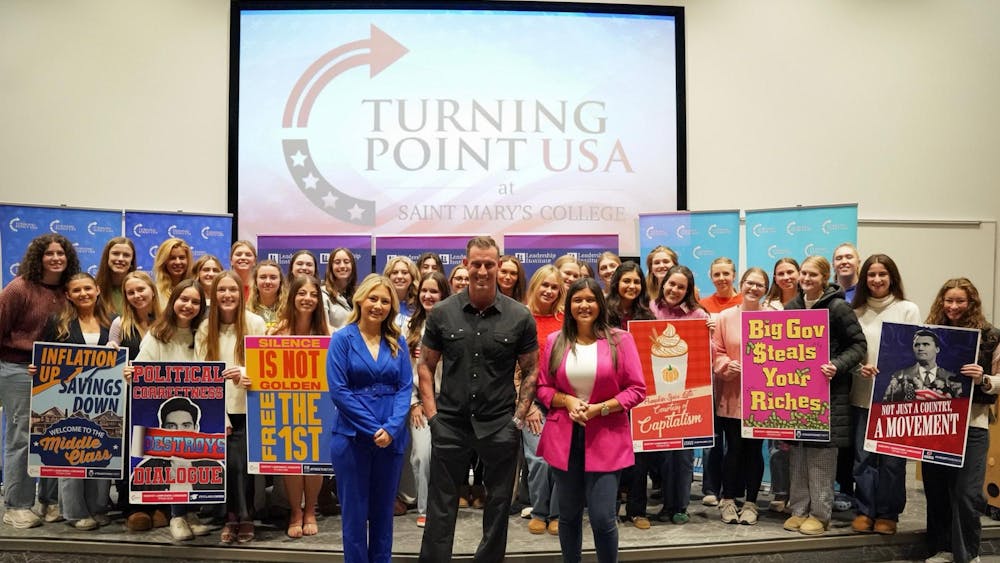At 1:45 p.m. on Tuesdays and Thursdays, I get lunch with my friend at South Dining Hall. Afterward, we get acai refreshers at Starbucks and head to the library. Once we find a table, we each put in our airpods, play a song by The 1975 and start a game of Minesweeper. All of this is done in almost mime-like mimicry.
On one of these Tuesdays or Thursdays, as I was rapidly sweeping mines, I took a moment to contemplate what I was doing. Here I was listening to the 1975, a band my friend was a big fan of but one I never really cared for. Not to mention the Starbucks cup on the table, a drink my friend loved but something I never used to waste flex points on. But now, Apple Music just informed me that The 1975 was my fifth most listened-to artist of the year, and probably half my flex points have gone straight to Starbucks. From the things I say, the clothes I wear, the way I think, the food I eat and the jokes I make, aspects of my friends shine through. As I realized just how much I have been influenced by my friends, I began to wonder, is it even possible to be my own person?
My slow molding into my friends is the result of the social proximity effect. Humans are social creatures. We are highly influenced by the people we interact with and adopt the behaviors of those around us. It's likely you and your friends talk similarly, shop at the same places, eat the same foods, and practice similar habits. This is not the result of peer pressure, which involves a deliberate choice to fit in. Rather, this is largely an unconscious incorporation of social cues that inform one’s behavior. One of the biggest ways my friends have secretly infiltrated my personality is through my vocabulary. Thanks to my friends, I say “probs” quite frequently these days, despite the fact that I find it really annoying. Beyond vocabulary, I recently placed an order at Gap, a store I never shop at, but one that my friend raves about. I was never much of a fan of Culver's, but thanks to my Wisconsin friends, I now frequent it. And despite having never seen the film, I even quote “The Hunger Games” because my friends talk about it so much. And this is just the tip of the iceberg.
Yet this assimilation makes sense. In college, we all live such similar lives that it’s hard to remain distinct. My friends and I get dinner at the same time, eat at the same circle table in North Dining Hall, head to the same spot in the library, make the same jokes and recount the same stories when we’re too bored to study. With this much time together, we’re bound to become somewhat alike. But on a more creepy level, some studies suggest that my friends and I may even start to look alike. When people spend lots of time together, they use similar facial expressions such as frowning, looks of disgust, laughing and smiling. This causes wrinkles to develop in similar places and friends may begin to have similar facial patterns. With all this said, it’s clear that our friends have a notable impact on us.
This impact can have significant consequences. Studies have shown that habits such as eating healthy, smoking, drinking, exercising and more are heavily influenced by who we surround ourselves with. For example, a person’s chances of becoming obese increase by 57% if they have a friend who becomes obese. Furthermore, our friend’s disposition makes a big difference in our own moods and emotions. When I asked my friends in what ways they think we have influenced each other, one of them responded that thanks to us, he has “a more cynical and pessimistic outlook on life.” I like to think he’s joking, but if not he might want to reevaluate his choice of friends. Studies show that eliminating 10% of unhappy people in your life will have dramatic impacts on mood and disposition. It is important to harness the social proximity effect in order to live your healthiest and happiest life.
In the end, as much as I like to think that I’m my own free-thinking person with control over who I become, it is impossible to remain unchanged by those around me. But I think this is the point. Friendship involves letting go of a little bit of our individuality to make space for someone else in our lives. I love and admire the people I call my friends, and it makes me happy to think that I have a small part of them in my own personality.
Allison Abplanalp is a sophomore finance and accounting major. If she could change one thing about the English language, she would make "a lot" one word. Her least favorite month is March because every year she is devastated when she fails to pick the perfect march madness bracket.
Allison Abplanalp is a senior finance and accounting major. If she could change one thing about the English language, she would make "a lot" one word. Her least favorite month is March because every year she is devastated when she fails to pick the perfect March Madness bracket. You can contact Allison at aabplana@nd.edu.









